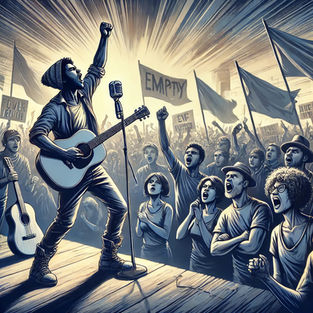
Photo- AI Generated
Hip-Hop's Cultural Impact: From the Bronx to Mainstream Dominance
Hip-hop originated as a cultural movement centred on self-expression, community, and resiliency in the thriving Bronx in the 1970s.
2 January 2025
Hip-hop originated as a cultural movement centred on self-expression, community, and resiliency in the thriving Bronx in the 1970s. What began as a regional phenomenon among underprivileged groups has developed into a global force that influences social movements, fashion, art, politics, and music. Hip-hop's ability to change while remaining loyal to its origins is demonstrated by its quick ascent from underground block parties to mainstream supremacy.
In New York City, hip-hop emerged during a period of economic desperation. Social upheaval, urban deterioration, and poverty were particularly prevalent in the South Bronx. Young Latino and African American communities looked for artistic ways to communicate their frustrations, aspirations, and reality among these challenges. Often considered the originator of hip-hop, DJ Kool Herc invented "breakbeats" at block parties by looping rhythmic parts of funk and soul albums to produce catchy beats.
Rap emerged when MCs (masters of ceremonies) started putting lyrics over the beats as DJs honed their skills. Beatboxers, breakdancers, and graffiti artists quickly joined the movement, transforming hip-hop into a complex cultural force that went well beyond music.
Hip-hop emerged from the Bronx and started to travel throughout the US by the 1980s. Hip-hop gained national attention thanks to groups like Run-D.M.C., Public Enemy, and N.W.A., which tackled issues including police brutality, systematic racism, and urban living. Hip-hop emerged as a voice for the voiceless, bringing attention to topics that the media frequently overlooks.
There was a creative boom during the genre's "golden era" in the late 1980s and early 1990s. Producers like Dr. Dre transformed the soundscape with G-funk, while artists like Tupac Shakur and The Notorious B.I.G. added genuine emotion to narrative. During this period, the East Coast-West Coast rivalry not only influenced hip-hop's story but also cemented its cultural importance.
Hip-hop was fully incorporated into popular culture at the turn of the twenty-first century. Hip-hop was elevated to new heights by artists like Jay-Z, Kanye West, and OutKast, who combined hip-hop with pop, rock, and R&B components. Because of its adaptability, the genre was able to reach a wider audience and its impact started to permeate other spheres of society.
For example, the rise of hip-hop caused a seismic upheaval in fashion. The distinction between luxury and streetwear became more hazy as high-end fashion businesses like Gucci and Louis Vuitton adopted the hip-hop look, as did brands like Adidas and Timberland. In order to appeal to younger audiences, hip-hop's cultural cachet was aggressively used in TV series, films, and commercial campaigns.
The impact of hip-hop on social issues also increased. From movements like Black Lives Matter to Kendrick Lamar's Pulitzer Prize-winning album DAMN, the genre has continued to be a vital forum for social commentary and action.
Hip-hop is a worldwide craze these days. The genre has been embraced by artists from all over the world, who have added aspects of their own cultures. Hip-hop's international appeal is demonstrated by the fact that it has given rise to subgenres like K-hip-hop, grime, and rap with Afrobeats influences in countries like South Korea, the UK, and Nigeria.
Hip-hop has become the most popular genre worldwide because to social media and streaming services. Hip-hop culture-related viral moments and new trends have been brought about by platforms like TikTok, while artists like Drake, Travis Scott, and Cardi B are still setting records.
Hip-hop, which is celebrating its 50th anniversary, is still going strong. In order to produce immersive experiences, the genre keeps experimenting with technologies like artificial intelligence and virtual reality. However, it continues to be an essential platform for under-represented voices to push limits and question conventions.
Hip-hop's path from its modest origins in the Bronx to its current position as a global cultural powerhouse is one of tenacity, inventiveness, and unwavering determination. Hip-hop's global influence demonstrates that it is more than simply music; it is a movement, a way of life, and a mirror reflecting the achievements and hardships of society.
Hip-hop's legacy is far from complete, despite the genre's ongoing innovation and inspiration.






